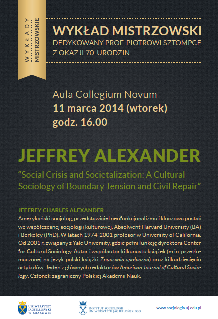Wykład Jeffreya C. Alexandra

Instytut Socjologii UJ zaprasza na wykład mistrzowski
dedykowany prof. Piotrowi Sztompce z okazji 70. urodzin
Jeffrey C. Alexander
Social Crisis and Societalization: A Cultural Sociology of Boundary Tension and Civil Repair
11 marca 2014 (wtorek), godz. 16.00
Aula Collegium Novum
Jeffrey Charles Alexander – amerykański socjolog, przedstawiciel neofunkcjonalizmu i kluczowa postać we współczesnej socjologii kulturowej. Absolwent Harvard University (BA) i Berkeley (PhD). W latach 1974-2001 profesor w University of California. Od 2001 r. związany z Yale University, gdzie pełni funkcję dyrektora Center for Cultural Sociology. Autor i współautor kilkunastu książek (m.in. przetłumaczonej na język polski książki Znaczenia społeczne) oraz kilkudziesięciu artykułów. Jeden z głównych redaktorów American Journal of Cultural Sociology. Członek zagraniczny Polskiej Akademii Nauk.
Streszczenie wykładu:
Drawing from cultural sociological concepts and employing narrative methods, this essay develops a theory of "societalization" to explain social reaction to three recent, globally significant upheavals – the financial crisis, church pedophilia, and media phone-hacking. While each of these strains was endemic for years and even decades, they had failed to generate broad crises: Reactions to strains were confined inside institutional boundaries and handled by intra-institutional elites according to the cultural logics of their particular spheres. The boundaries between spheres can be breached and the "steady state" disrupted only if there is code switching. Rather than institutional logics, strains are interpreted according to the cultural logics of the civil sphere. When intra-institutional strains become interpreted as challenges to civil discourse and interests, there is societalization. Inter-sphere boundaries become tense and there is widespread anguish about social justice and the future of democratic society. New scripts transform strain into trauma, once admired institutional elites become represented as perpetrators and honorable citizens constructed as helpless victims. In such conditions, the civil sphere becomes intrusive; projecting symbolic pollution and promoting legal intervention, the newly energized civil sphere triggers state-sponsored institutional repairs that aim for civil purification. While initially contrite, institutional elites soon engage in backlash efforts to resist reform. A war of the spheres ensues and, eventually, there is movement back to steady state. No matter the extent of civil repair, societalization cannot prevent the future eruption of social strains. In a differentiated and plural society, tensions between spheres remains, and episodic outbursts of societalization inevitable.

